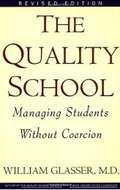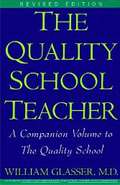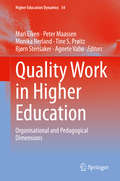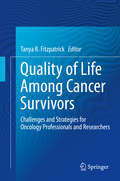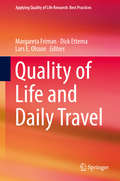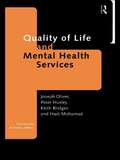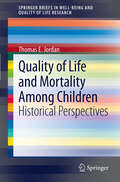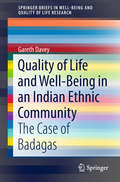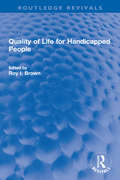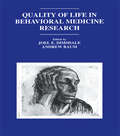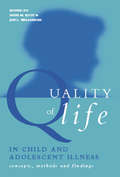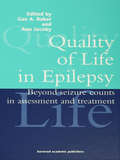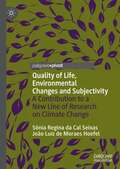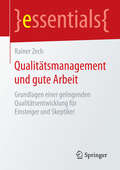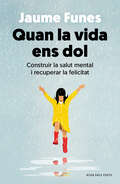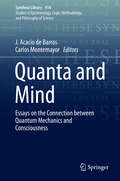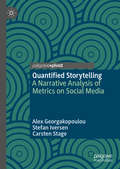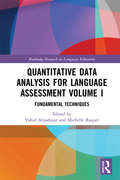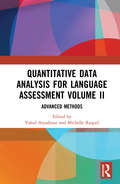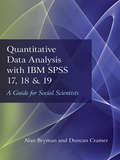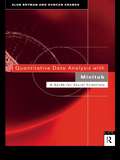- Table View
- List View
Quality School RI
by William Glasser"This should be required reading by every school administator, every teacher, every board member and all university faculty involved in the training of teachers. There is no doubt that we need to squeeze all blame, all coerion and all criticism out of any people-related business. Not until we realize that schools are in a people business will we ever be able to make meaningful changes."--Dr. Albert Mamary, former superintendent of schools, Johnson City, New York
Quality School RI
by William Glasser"This should be required reading by every school administator, every teacher, every board member and all university faculty involved in the training of teachers. There is no doubt that we need to squeeze all blame, all coerion and all criticism out of any people-related business. Not until we realize that schools are in a people business will we ever be able to make meaningful changes."--Dr. Albert Mamary, former superintendent of schools, Johnson City, New York
Quality School Teacher RI
by William GlasserThis book is the follow-up to its immediate predecessor, The Quality School. Based on the work of W. Edwards Deming and on Dr. Glasser's own choice theory, it is written for teachers who are trying to abandon the old system of boss-managing, which is effective for less than half of all students. William Glasser, M.D., explains that only through lead-management can teachers create classrooms in which all students not only do competent work but begin to do quality work. These classrooms are the core of a quality school. The book begins by explaining that to persuade students to do quality schoolwork, teachers must first establish warm, totally noncoercive relationships with their students; teach only useful material, which means stressing skills rather than asking students to memorize information; and move from teacher evaluation to student self-evaluation. There are no generalities in this book: It provides the specifics that classroom teachers seek as they begin the move to quality schools.
Quality Work in Higher Education: Organisational and Pedagogical Dimensions (Higher Education Dynamics #54)
by Peter Maassen Bjørn Stensaker Monika Nerland Mari Elken Tine S. Prøitz Agnete VabøThis book focuses on quality work in higher education, and examines the relationship between the organizational and pedagogical dimensions of quality work in higher education. Bringing together different disciplinary traditions, including educational science, sociology, and organisational studies, it addresses the following principal research question: How is quality work carried out in higher education?The book addresses a wide variety of academic, administrative and leadership practices that are involved in quality work in higher education institutions. The chapters in this book examine core issues crucial in the design and content of study programs, such as modes of teaching, learning and curricula design, as well as institutional practices regarding assessment and quality enhancement. The introductory and concluding chapter present an overarching focus on quality work as a lens to analyse intentional activities within higher education institutions directed at how study programmes and courses are designed, governed, and operated.
Quality of Care for PTSD and Depression in the Military Health System
by Susan M. Paddock Elizabeth M. Sloss Harold Alan Pincus Heather Krull Kimberly A. Hepner Carol P. Roth Martha J. Timmer Shaela MoenUnderstanding the current quality of care for posttraumatic stress disorder (PTSD) and depression delivered to service members is an important step toward improving care across the Military Health System (MHS). T.his report describes the characteristics of active-component service members who received care for PTSD or depression through the MHS and assesses the quality of care received using quality measures derived from administrative data
Quality of Life Among Cancer Survivors
by Tanya R. FitzpatrickThis multidisciplinary reference explores the concepts and realities of quality of life among cancer survivors in its physical, psychological, cognitive, social, and familial dimensions. Informed by a broad range of fields including genetics, psychiatry, nursing, dentistry, rehabilitation, and ethics, it addresses daily challenges of living for this population, from self-care to cultural concerns and from social interactions to experiences with providers. Family issues of pediatric, young adult, and elder survivors, caregiving parents, and siblings are a major area of concern. And contributors describe interventions for survivors as individuals, in family content, and as part of integrated care across primary and specialty settings. Included among the topics: Play, leisure activities, and cognitive health among older cancer survivors. Genetic mutations in cancer susceptibility genes: a family history of cancer. Cancer patients in a pediatric intensive care unit: a single center experience. The impact of childhood cancer on the quality of life among healthy siblings. When cancer returns: family caregivers and the hospice team. Experiencing cancer services: a story of survival and dissatisfaction. A significant addition to the cancer survivorship literature, Quality of Life Among Cancer Survivors is a practice-building resource for oncology and allied health professionals, health psychologists, and social workers, as well as researchers in these fields.
Quality of Life and Daily Travel (Applying Quality Of Life Research Ser.)
by Dick Ettema Margareta Friman Lars E. OlssonThis volume analyses the relevance of daily travel in the quality of life of individuals. It provides a broad understanding of the links between life satisfaction, well-being and travel, the importance of commuting, and different evaluations and measures to assess the experience of commuting and quality of life. Chapters in this book relate travel and quality of life to the built environment, accessibility and exclusion, travel mode choice, travel satisfaction and emotions. It brings together distinguished researchers from a variety of academic backgrounds providing conceptualizations and applications, presented as case studies, for daily travel and well-being. Findings presented in this book are highly relevant for transport planners, transport marketers, public transport authorities, and environmental professionals in the pursuit of improving people’s life.
Quality of Life and Mental Health Services
by Peter Huxley Dr Peter Huxley Keith Bridges Hadi Mohamad Joseph OliverThis book is about the lives of patients, about the health and social care services provided to help them, and about ways of examining the impact these services make on them. Based on the authors' experience of using and developing a particular operational measure, the Lancashire Quality of Life Profile, which has been used successfully in many different studies and countries, it provides managers and practitioners in mental health with valuable normative data, insights and ideas about the role of QOL in service evaluation.
Quality of Life and Mortality Among Children
by Thomas E. JordanThis birefs examines mortality among young children in the period from the seventeenth to the nineteenth century. It does so using several types and sources of information from the census unit England and Wales, and from Ireland. The sources of information used in this study include memoirs, diaries, poems, church records and numerical accounts. They offer descriptions of the quality of life and child mortality over the three centuries under study. Additional sources for the nineteenth century are two census-derived numerical indexes of the quality of life. They are the VICQUAL index for England and Wales, and the QUALEIRE index for Ireland. Statistical procedures have been applied to the numbers provided by the sources with the aim to identify effects of and associations between such variables as gender, age, and social background. The briefs examines the results to consider the impact of children's deaths upon parents and families, and concludes that there are differences and continuities across the centuries.
Quality of Life and Well-Being in an Indian Ethnic Community: The Case Of Badagas (SpringerBriefs in Well-Being and Quality of Life Research)
by Gareth DaveyThis book explores the quality of life among Badagas, an ethnic minority group in South India, as they navigate a society in flux, with specific reference to rural-to-urban migration and new media. At an empirical level, it reveals how Badagas understand themselves and the multifaceted changes in their culture and daily lives, exploring a pertinent concern at the forefront of debate about the future from a global perspective. The book draws attention to the fact that people are adopting flexible identities and lifestyles in an attempt to survive and thrive in a changing India and world, a new ‘Indian-ness’ shaped at the local level. It offers a timely update on previous research on Badagas, which dates to the 1990s, and also serves as an important case study on people’s experiences of the social and economic transformation of Indian society as they become accustomed to new ideas, products, and ways of life. As such, it is a must-read for all those interested in quality of life in India and developing societies.
Quality of Life for Handicapped People (Routledge Revivals)
by Roy I. BrownFirst published in 1988, Quality of Life for Handicapped People examines developments and innovations in research and practice concerning the quality of life for those with disabilities. The book centres on the topic of rehabilitation education, with a particular focus on issues relating to quality of life, including what is meant by ‘quality of life’ and the measures and systems required to assess the variables involved. It highlights the significance of rehabilitation education in underlining the key issue of how individuals feel about themselves and how they perceive the services available to them for the purpose of rehabilitation. It considers the importance of environment and the improvement of environment in increasing quality of life, and examines a range of vocational and social programmes from a variety of perspectives. Quality of Life for Handicapped People will be of use to those with an interest in the history and development of rehabilitation education.
Quality of Life in Behavioral Medicine Research (Perspectives on Behavioral Medicine Series)
by Joel E. Dimsdale Andrew BaumThe number of, and interest in, quality of life studies has grown dramatically in the last decade. On an ever increasing basis, patients, clinicians, researchers, and health policy regulators are considering quality of life in assessing treatment alternatives. Unfortunately, most discussions of quality of life are narrow in scope -- applying to only one disease group. This unique book represents the concerted effort of experts in academia, federal government health care regulators, and pharmaceutical industry representatives to define the promise and the problems associated with quality of life studies. The issues covered range from cross cutting ones to those that are specific to particular illnesses. Because quality of life takes into consideration such domains as mood, vocation, family, sexual functioning, social participation, and costs, this book will serve as an invaluable companion to readers with an interest in behavioral medicine research.
Quality of Life in Child and Adolescent Illness: Concepts, Methods and Findings
by Hans M. Koot Jan L. WallanderHow can we measure the quality of life in children and adolescents with chronic disease? Major progress in the diagnosis and treatment of severe and chronic disease has led to an increased number of children and their families having to adapt and cope with the impact of disease, survival, and the cost of treatment. Health professionals have responded to this by developing a diversity of instruments for measuring quality of life for use in paediatrics, psychology and public health. This book introduces the reader to the emerging field of quality of life assessment and provides a comprehensive overview of the conceptual and methodological issues concerning quality of life in child and adolescent illness. Particular emphasis is provided on current efforts to measure the impact of specific chronic conditions on different domains of child functioning. Future directions are outlined for the development of appropriate instruments for measuring quality of life in children and adolescents. Quality of Life in Child and Adolescent Illness is intended for psychologists, paediatricians, paediatric nurses, child psychiatrists, public health professionals, researchers and other interested readers from the undergraduate to the working professional.
Quality of Life in Epilepsy: Beyond Seizure Counts in Assessment and Treatment
by Gus A. Baker Ann JacobyThough clinical aspects of epilepsy such as seizure control are crucially important to its management, increasing attention is being given to wider quality of life issues. Epilepsy continues to be an often misunderstood and stigmatising condition; for the vast majority of people whose seizures can be well controlled, the social and psychological repercussions are often of greater significance than the seizures themselves.The increasing emphasis on the importance of non-clinical outcomes in the assessment of new treatments and management strategies for chronic conditions such as epilepsy has stimulated interest in methodological issues in assessing quality of life. This book reviews the recent literature on the impact of epilepsy on everyday experience and the methodological issues involved in assessing that impact. It also considers the perspectives of a range of health professionals involved in caring for people with epilepsy and how, through appropriate management, the impact on their lives can be minimised.
Quality of Life in Japan: Contemporary Perspectives on Happiness (Quality of Life in Asia #13)
by Ming-Chang Tsai Noriko IwaiThis edited volume approaches the life experiences and well-being of Japanese people from an empirical perspective. It explores the current trend of happiness among Japanese over time and examines the association of income, lifestyle, and perceived life conditions using modern econometric models with supplementary qualitative observations. Issues relating to ageing, gender, household division of labour, and emigration are also examined to provide a wide scope of results based on both survey and field methods for culturally sensitive researchers. Going beyond the conventional cultural interpretation of the uniqueness of the Japanese case, this book provides timely, empirical evidence for understanding how the various social groups comprising the Japanese population have enjoyed a better quality of life, while some groups are very dissatisfied with social arrangements and have elected to emigrate. The book is a pioneering endeavour to reveal the detailed structure of quality of life and well-being in Japanese society.
Quality of Life, Environmental Changes and Subjectivity: A Contribution to a New Line of Research on Climate Change
by Sônia Regina da Cal Seixas João Luiz de Moraes HoefelIn this volume, the authors consider how environmental changes affect our social, cultural and political lives and, in doing so, have a direct influence on individuals’ health. In contrast to previous research in the area, da Cal Seixas and de Moraes Hoefel emphasize both physical health and mental health as measures of human suffering, in an approach informed by the concept of subjectivity. Ultimately, the authors argue that contemporary environmental changes have a significant effect on the mental and physical wellbeing of the world’s population, and that analysis and proposals for action should address both concerns in an effort to improve our quality of life.
Qualitätsmanagement und gute Arbeit: Grundlagen einer gelingenden Qualitätsentwicklung für Einsteiger und Skeptiker (essentials)
by Rainer ZechIn diesem Essential wird das traditionelle Qualitätsmanagement als verdecktherrschaftliches Disziplinarsystem entschlüsselt und die Frage diskutiert, was unter Qualität substanziell zu verstehen ist. Der Autor argumentiert dafür, dass die Qualitätsfrage in den Kontext der großen Thematik eines guten Lebens in einer gerechten Gesellschaft gehört. Zu diesem Zweck wird sowohl das Gute als auch das Gerechte kurz skizziert. Daraus werden die Voraussetzungen einer entsprechend gelingenden Qualitätsentwicklung abgeleitet, um schließlich beispielhaft für den Bereich der personenbezogenen sozialen Dienstleistungen ein Qualitätsentwicklungssystem vorzustellen, das den Fallen der Disziplinierung entgeht und die Entscheidung über die Definition guter Arbeit - als Prozess und Ergebnis - in die Hände der Arbeitenden gibt.
Quan la vida ens dol: Construir la salut mental i recuperar la felicitat
by Jaume FunesQuan la vida ens dol és una reflexió rigorosa que vol ajudar les persones perquè prenguin consciència que una bona salut mental és part del camí que porta a seguir avançant cap a la felicitat. En un moment o altre de la vida apareixen els malestars. Habitualment, el magatzem de les experiències positives viscudes, les habilitats vitals apreses i la proximitat activa d'altres persones fan que els superem. Però hi ha vegades en què això no és així, i el dolor de viure encaixats en una existència que no volem fa que tot es trastorni. Sigui quina sigui la situació, ens trobem enmig d'alteracions d'una part de la salut, la mental, per a la qual no hi ha acord sobre com descriure-la, com explicar-la, com dedicar-hi l'atenció adequada. I acabem immersos en una mena de supermercat de les teràpies, en una gestió interessada dels fàrmacs, en una absència d'escolta i d'acompanyament. Aquest llibre pretén ajudar a tenir una visió personal més coherent sobre la salut i la malaltia mentals, a compartir un discurs social que aporti i que no segregui, a ampliar el grup dels professionals que comparteixen una visió integradora i que donen respostes que humanitzen, a exigir dels nostres responsables polítics una planificació coherent i no la venda d'etiquetes i de serveis etiquetats per curar les malalties mentals.
Quanta and Mind: Essays on the Connection between Quantum Mechanics and the Consciousness (Synthese Library #414)
by Carlos Montemayor J. Acacio de BarrosThis edited volume examines aspects of the mind/consciousness that are relevant to the interpretations of quantum mechanics. In it, an international group of contributors focus on the possible connections between quantum mechanics and consciousness. They look at how consciousness can help us with quantum mechanics as well as how quantum mechanics can contribute to our understanding of consciousness. For example, what do different interpretations aimed at solving the measurement problem in quantum mechanics tell us about the nature of consciousness, such as von Neumann's interpretation? Each interpretation has, associated to it, a corresponding metaphysical framework that helps us think about possible “models” of consciousness. Alternatively, what does the nature of consciousness tell us about the role of the observer and time reversibility in the measurement process? The book features 20 papers on contemporary approaches to quanta and mind. It brings together the work of scholars from different disciplines with diverse views on the connections between quanta and mind, ranging from those who are supportive of a link between consciousness and quantum physics to those who are very skeptical of such link. Coverage includes such topics as free will in a quantum world, contextuality and causality, mind and matter interaction, quantum panpsychism, the quantum and quantum-like brain, and the role of time in brain-mind dynamics.
Quantified Storytelling: A Narrative Analysis of Metrics on Social Media
by Carsten Stage Alex Georgakopoulou Stefan IversenThis book interrogates the role of quantification in stories on social media: how do visible numbers (e.g. of views, shares, likes) and invisible algorithmic measurements shape the stories we post and engage with? The links of quantification with stories have not been explored sufficiently in storytelling research or in social media studies, despite the fact that platforms have been integrating sophisticated metrics into developing facilities for sharing stories, with a massive appeal to ordinary users, influencers and businesses alike. With case-studies from Instagram, Reddit and Snapchat, the authors show how three types of metrics, namely content metrics, interface metrics and algorithmic metrics, affect the ways in which cancer patients share their experiences, the circulation of specific stories that mobilize counter-publics and the design of stories as facilities on platforms. The analyses document how numbers structure elements in stories, indicate and produce engagement and become resources for the tellers’ self-presentation. This book will be of interest to students and scholars working in the fields of narrative and social media studies, including narratology, biography studies, digital storytelling, life-writing, narrative psychology, sociological approaches to narrative, discourse and sociolinguistic perspectives.
Quantitative Data Analysis for Language Assessment Volume I: Fundamental Techniques (Routledge Research in Language Education)
by Vahid Aryadoust Michelle RaquelQuantitative Data Analysis for Language Assessment Volume I: Fundamental Techniques is a resource book that presents the most fundamental techniques of quantitative data analysis in the field of language assessment. Each chapter provides an accessible explanation of the selected technique, a review of language assessment studies that have used the technique, and finally, an example of an authentic study that uses the technique. Readers also get a taste of how to apply each technique through the help of supplementary online resources that include sample data sets and guided instructions. Language assessment students, test designers, and researchers should find this a unique reference as it consolidates theory and application of quantitative data analysis in language assessment.
Quantitative Data Analysis for Language Assessment Volume II: Advanced Methods
by Vahid Aryadoust Michelle RaquelQuantitative Data Analysis for Language Assessment Volume II: Advanced Methods emonstrates advanced quantitative techniques for language assessment. The volume takes an interdisciplinary approach and taps into expertise from language assessment, data mining, and psychometrics. The techniques covered include Structural Equation Modeling, Data Mining, Multidimensional Psychometrics and Multilevel Data Analysis.Volume II is distinct among available books in language assessment, as it engages the readers in both theory and application of the methods and introduces relevant techniques for theory construction and validation. This book is highly recommended to graduate students and researchers who are searching for innovative and rigorous approaches and methods to achieve excellence in their dissertations and research. It is also a valuable source for academics who teach quantitative approaches in language assessment and data analysis courses.
Quantitative Data Analysis with IBM SPSS 17, 18 & 19: A Guide for Social Scientists
by Alan Bryman Duncan CramerThis latest edition has been fully updated to accommodate the needs of users of SPSS Releases 17, 18 and 19 while still being applicable to users of SPSS Releases 15 and 16. As with previous editions, Alan Bryman and Duncan Cramer continue to offer a comprehensive and user-friendly introduction to the widely used IBM SPSS Statistics. The simple, non-technical approach to quantitative data analysis enables the reader to quickly become familiar with SPSS and with the tests available to them. No previous experience of statistics or computing is required as this book provides a step-by-step guide to statistical techniques, including: Non-parametric tests Correlation Simple and multiple regression Analysis of variance and covariance Factor analysis. This book comes equipped with a comprehensive range of exercises for further practice, and it covers key issues such as sampling, statistical inference, conceptualization and measurement and selection of appropriate tests. The authors have also included a helpful glossary of key terms. The data sets used in Quantitative Data Analysis with IBM SPSS 17, 18 and 19 are available online at http://www.routledgetextbooks.com/textbooks/_author/bryman-9780415579193/; in addition, a set of multiple-choice questions and a chapter-by-chapter PowerPoint lecture course are available free of charge to lecturers who adopt the book.
Quantitative Data Analysis with Minitab: A Guide for Social Scientists
by Alan Bryman Duncan CramerQuantitative data analysis is now a compulsory component of most degree courses in the social sciences and students are increasingly reliant on computers for the analysis of data. Quantitative Data Analysis with Minitab explains statistical tests for Minitab users using the same formulae free, non technical approach, as the very successful SPPS version.Students will learn a wide range of quantitative data analysis techniques and become familiar with how these techniques can be implemented through the latest version of Minitab. Techniques covered include univariate analysis (with frequency table, dispersion and histograms), bivariate (with contingency tables correlation, analysis of varience and non-parametric tests) and multivariate analysis (with multiple regression, path analysis, covarience and factor analysis). In addition the book covers issues such as sampling, statistical significance, conceptualisation and measurement and the selection of appropriate tests. Each chapter concludes with a set of exercises.Social science students will welcome this integrated, non mathematical introduction to quantitative data anlysis and the minitab package.
Quantitative Data Analysis with SPSS 12 and 13: A Guide for Social Scientists
by Alan Bryman Duncan CramerThis new edition has been completely updated to accommodate the needs of users of SPSS Release 12 and 13 for Windows, whilst still being applicable to those using SPSS Release 11 and 10. Alan Bryman and Duncan Cramer provide a non-technical approach to quantitative data analysis and a user-friendly introduction to the widely used SPSS. No previous familiarity with computing or statistics is required to benefit from this step-by-step guide to techniques including: Non-parametric tests Correlation Simple and multiple regression Multivarate analysis of variance and covariance Factor analysis The authors discuss key issues facing the newcomer to research, such as how to decide which statistical procedure is suitable, and how to interpret the subsequent results. Each chapter contains worked examples to illustrate the points raised and ends with a comprehensive range of exercises which allow the reader to test their understanding of the topic. This new edition of this hugely successful textbook will guide the reader through the basics of quantitative data analysis and become an essential reference tool for both students and researchers in the social sciences. The datasets used in Quantitative Data Analysis for SPSS Release 12 and 13 are available online at www.psypress.com/brymancramer/ .
